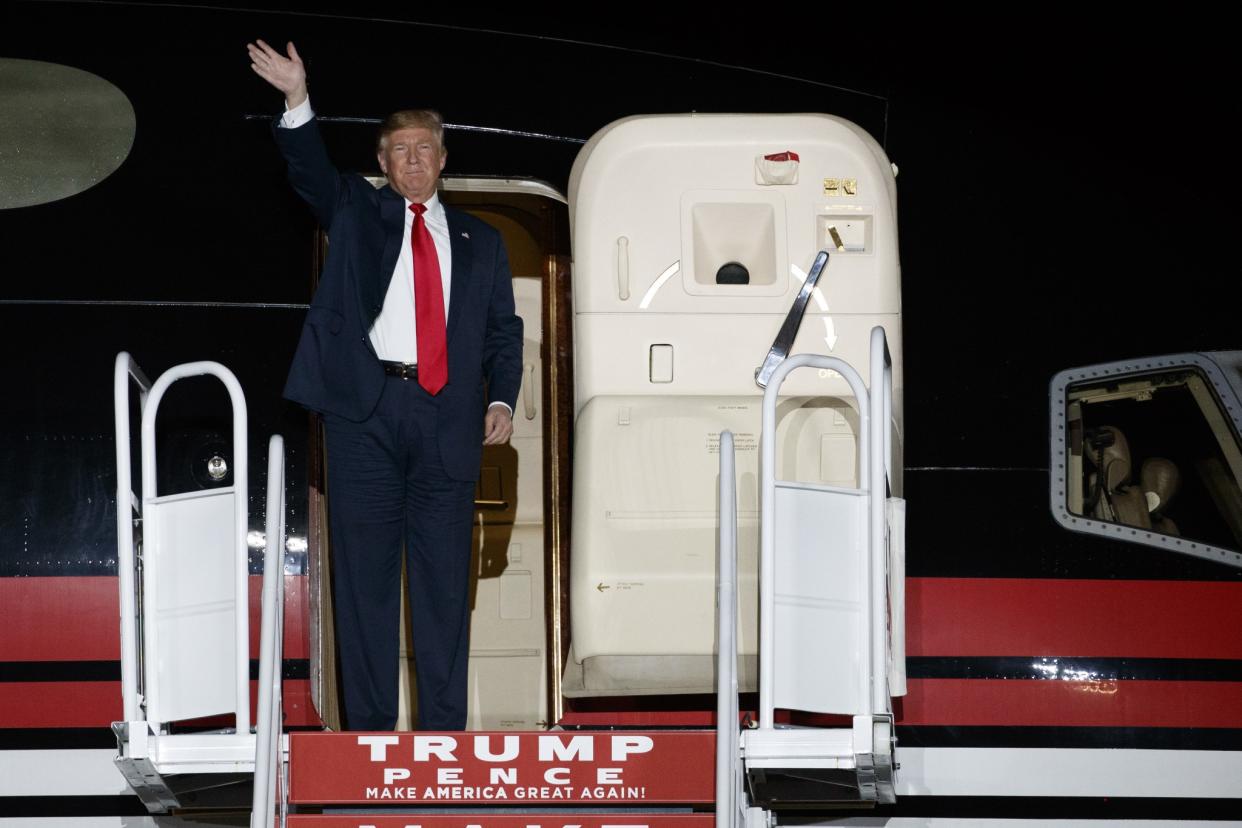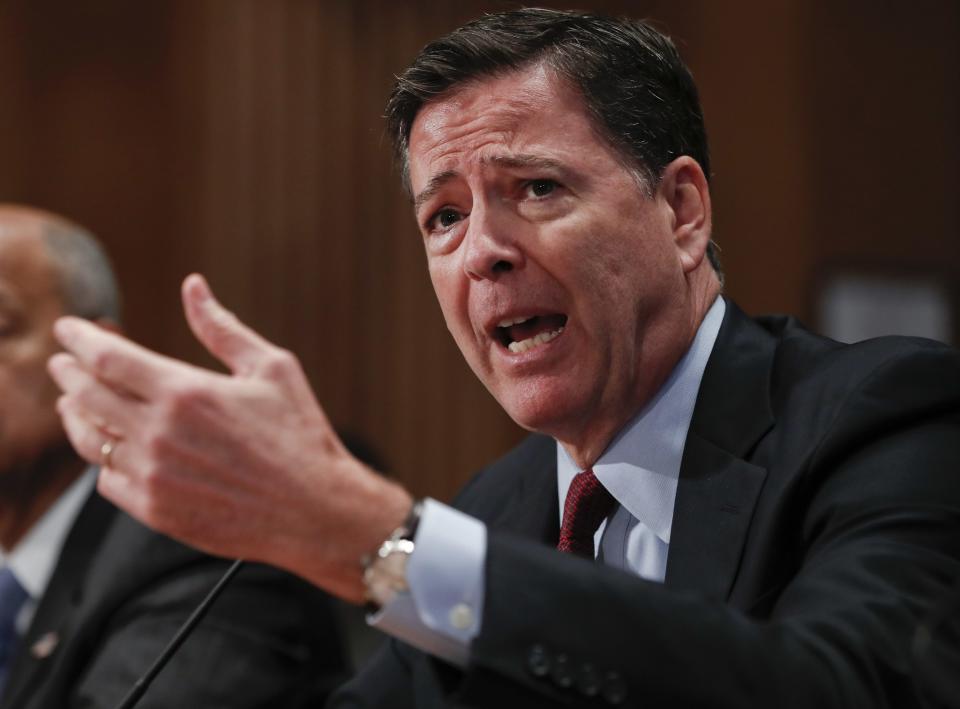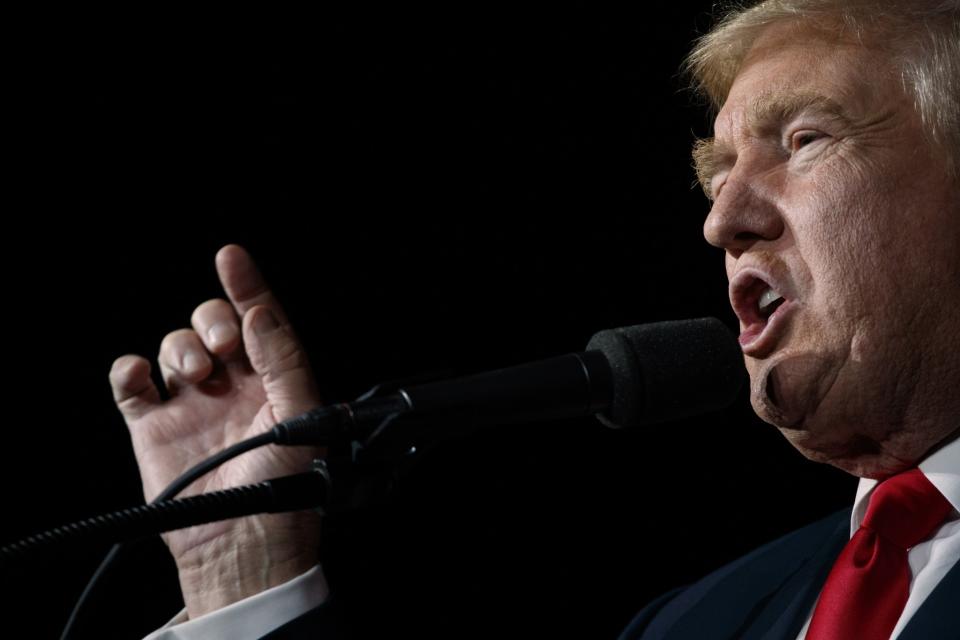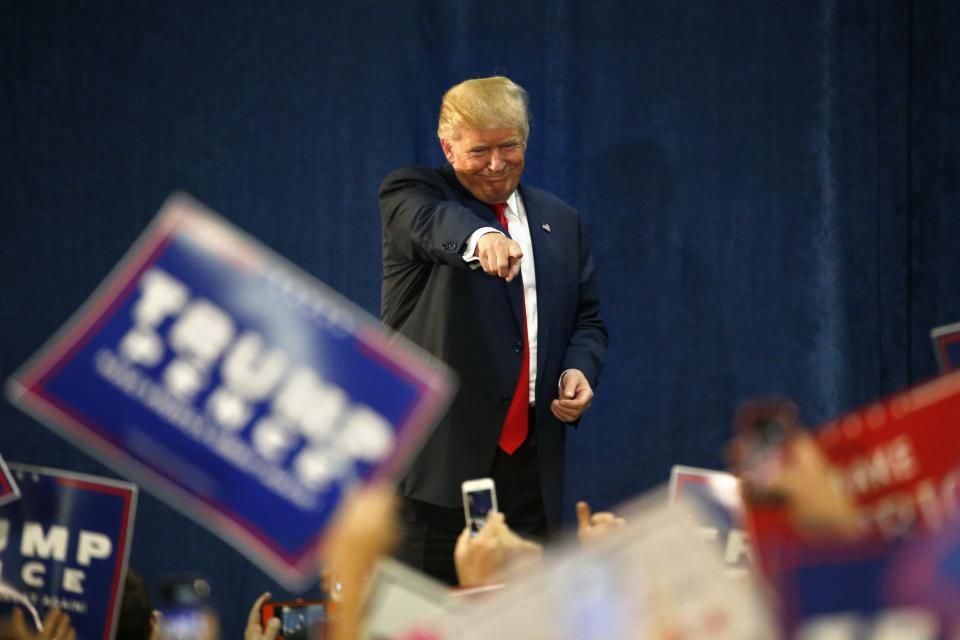Trump, following his gut, makes a final push into blue states

GRAND RAPIDS, Mich.— Hoping to capitalize on the latest turn of events involving Hillary Clinton’s emails, Donald Trump is taking his campaign into Democratic-leaning states in a last-minute quest to expand the map of possible routes to victory.
The Republican presidential nominee has long bragged of his intentions to put traditionally Democratic states into play, including Connecticut, New Jersey and New York, but in recent months his campaign had been focused on a narrow list of battleground states, such as Ohio, North Carolina and Florida.
But in a move that seems driven more by gut instincts than hard polling data, the Trump campaign scheduled a final stretch swing through New Mexico on Sunday, where the GOP candidate held an airport rally in Albuquerque. On Monday, the celebrity businessman is making two stops in Michigan — stumping in Grand Rapids and in the Detroit suburbs. Both are traditionally Democratic states, where recent polls have found Clinton with a healthy lead over her Republican rival.
Still, upon taking the stage in Grand Rapids on Monday afternoon, Trump ignored the polls that showed him trailing Clinton. “We’re doing great in every poll. We’re doing amazing,” Trump said. “I think we’re going to win Michigan!”
On Tuesday, Trump is scheduled to return to Wisconsin, another Democratic-leaning state. And Trump aides are also eyeing a return to Pennsylvania, a state once viewed as up for grabs but now trending more toward Clinton, according to recent polls.
Trump had been focusing heavily on the suburbs of Philadelphia, hoping to win over suburban white women, but the candidate largely ceded that ground to Clinton in recent weeks, focusing his efforts on Florida and North Carolina — where polls suggest the race is essentially tied. But Trump aides say they once again see opportunity there and are deploying a new surrogate — Trump’s wife, Melania, a reluctant presence on the campaign trail, who is scheduled to deliver a speech near Philadelphia on Thursday aimed at bolstering her husband’s position with female voters.
Trump aides are also considering a major policy speech as early as Tuesday making his case for why he should win the presidency. It would be Trump’s second attempt at a closing argument speech. The GOP candidate delivered a version of it a little over a week ago in Gettysburg, Pa., but the substance was largely overshadowed by Trump breaking from the script to attack the media and threaten to sue women who have accused him of inappropriate sexual behavior toward them.

The developments come as Trump has sought to take advantage of FBI Director James Comey’s surprise decision, announced last Friday, to examine more emails from Hillary Clinton’s tenure as secretary of state. The word broke Friday afternoon just as Trump was set to take the stage at a rally in Manchester, N.H. — another battleground state that has been trending away from him.
Trump reveled in the news, praising the FBI — after months of denouncing it as part of a “rigged system” following Comey’s announcement in July that Clinton would not be prosecuted for sending emails that contained classified information from her private server.
But the GOP candidate, who has rarely missed an opportunity to take credit for developments in the campaign, was somewhat subdued in his reaction — at least for him. Trump aides had privately counseled the candidate not to “gloat,” as one adviser put it, and to simply state the facts of the case, so as not to shift the focus away from her and back to him.
At first, Trump followed the advice. When word broke Friday afternoon that the emails in question had been discovered as part of a federal investigation into Anthony Weiner, the estranged husband of top Clinton aide Huma Abedin, Trump did not mention the news at subsequent rallies in Maine and Iowa — surprising reporters who had expected him to attack Weiner. (In August, when the latest in a series of sex-messaging scandals involving Weiner broke, and Abedin announced their separation, Trump jumped on the news to suggest that Abedin might have compromised national security by sharing information with her husband.)
But Trump couldn’t stay away from the topic for long. Campaigning late Saturday in Phoenix, the real estate mogul recalled his previous Twitter messages about Weiner and boasted about his prediction that the former Democratic congressman would become a liability for Clinton. “I don’t know if anybody saw my comments on Anthony Weiner,” Trump declared. “It’s called instincts, folks. I had no idea I was going to be that accurate!”

On Sunday in Las Vegas, Trump again broke from his prepared remarks and gave a sarcastic shout-out to the disgraced former congressman. “We never thought we were going to say ‘thank you’ to Anthony Weiner,” the GOP nominee said, prompting some in the crowd to start a brief “Weiner! Weiner!” chant.
At the same time, Trump has sought to broaden his attacks on Clinton, reminding scandal-fatigued Americans that she has been mired in investigations and controversies dating back to her husband’s run for the White House more than 20 years ago, and will almost certainly be again if she wins the presidency.
Campaigning in Greeley, Colo., on Sunday, he attacked Clinton by citing one of her most potent surrogates, first lady Michelle Obama. “For years I’ve heard the nastiest quote. … ‘If you can’t control your own house, you have no right to essentially be in the White House,’” Trump said. “And I said what a nasty quote. I would never say that quote … and then I found out three days ago that Michelle Obama was the one that said it, about Hillary when they ran against Hillary.”
“Hillary Clinton’s corruption is corrosive to the soul of our nation, and it must be stopped,” he added.
Trump’s late foray into Democratic states is risky for a candidate whose ground-game operation is heavily reliant on the Republican National Committee, which has been focusing its efforts mostly on key battlegrounds like Ohio, North Carolina and Florida. But both RNC officials and Trump aides have emphasized a network beyond the crucial swing states and their determination to work together to win wherever Trump thinks he can.
“There is no daylight between the RNC and the Trump campaign,” David Bossie, Trump’s deputy campaign manager, said last week.
It was not immediately clear if Trump would seek to shift campaign resources to boost operations in places where he is hoping to expand his map to victory, but he has long tested the theory that his celebrity makes him less reliant on traditional get-out-the-vote efforts.
Aides are hoping Trump’s last-minute visits might resonate with working-class and blue-collar voters turned off by Clinton’s scandals and allow the campaign to capitalize on any other missteps by the Democratic nominee. It’s a strategy GOP sources close to the campaign say has been driven by Steve Bannon, the former Breitbart executive who is now chief executive of the Trump campaign. Bannon has been traveling with Trump over the past several days.

In addition to the shifting itinerary, Trump aides have pushed the candidate to be more positive on the stump — talking more about his own vision instead of simply attacking Clinton. At one point, he even bragged about going positive.
“I will continue to address and expose the criminal corruption of Hillary Clinton and the threat to the survival of our country, but I also want to spend these next nine days with the wonderful people of this country talking about my vision for making America great again,” Trump said in Greeley. “Let’s talk positive. Let’s talk positive.”
Over the past few days, he has added a few new lines to his stump speech, casting himself as a dreamer and a builder who wants to transform the country in the same way he recast the skyline of New York City.
“I see such untapped potential in our country,” Trump said in Colorado.
While Trump aides insist they feel momentum heading into an election that is now just a little over a week away, they are cautious about any potential surprises, after weeks of weathering stories about Trump’s alleged misbehavior toward women and questions about whether he’s paid taxes and the true scope of his wealth.
It was a worry the candidate himself brought up on Sunday, seeming to suggest Clinton will do anything to stop his campaign.
“No doubt in the next nine days Hillary and her special interests will say and do something to distract from her crime and to distract from the very important issues facing our country,” Trump said.
In Michigan, he admonished supporters not to stand on the sidelines of an election he predicted could be the most important in a generation.
“Vote with all of your heart. Vote with all of your soul,” the candidate declared. “Because this is it.”




